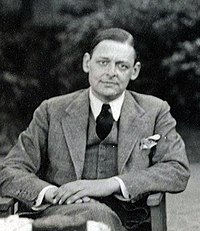(Created page.) |
(Added "Sound" and removed Kafka.) |
||
| (9 intermediate revisions by the same user not shown) | |||
| Line 1: | Line 1: | ||
{{:Poetry/Tabs}} | {{:Poetry/Tabs}} | ||
{{dc|M}}{{Start|odernist poetry refers to a wide-ranging cultural movement}} that emerged in the early 20th century and is characterized by a radical break with traditional forms and values. | |||
{{Collapse top|title=General Characteristics|bg=#F0F2F5|left=yes}} | |||
Some of the general characteristics of modernist poetry include: | |||
* Experimentation with form: Modernist poets often experimented with new forms of poetry, including free verse, fragmented or disjointed lines, and unconventional structures. | |||
* Use of symbolism and allusion: Modernist poets frequently used symbols and allusions to represent complex ideas or emotions. | |||
* Emphasis on individual experience: Modernist poets often focused on the individual experience rather than the collective or universal. | |||
* Critique of society: Many modernist poets criticized the social and cultural norms of their time, often using their poetry as a means of social and political commentary. | |||
* Ambiguity and fragmentation: Modernist poets often employed ambiguity and fragmentation to reflect the fragmented nature of modern life and thought. | |||
* Stream-of-consciousness: Modernist poets sometimes used the stream-of-consciousness technique to explore the inner workings of the mind and to depict the flow of thoughts and emotions. | |||
* Rejection of traditional literary conventions: Modernist poets rejected traditional literary conventions such as rhyme, meter, and narrative structure. | |||
* Interest in multiple perspectives: Modernist poets often explored multiple perspectives and points of view, including those of marginalized and minority groups. | |||
< | These characteristics are not exhaustive, but they provide a general sense of the key features of modernist poetry. | ||
{{Big|T. S. Eliot}} | {{Collapse bottom}} | ||
{{FH}} | |||
<div style="display: flex; justify-content: center; padding: 25px 0 25px 0;"> | |||
{| style="width: 80%;" | |||
|- style="font-align: left;" | |||
| colspan="3" | {{Big|W. H. Auden}} | |||
|- style="vertical-align: top;" | |||
| colspan="2" |{{bulleted list|“[[Musée des Beaux Arts]]”|“[[The More Loving One]]”|“[[O What Is That Sound]]”}} | |||
| [[File:W. H. Auden (1956 press photo).jpg|thumb|200px]] | |||
|- | |||
| colspan="3" | {{Line}} | |||
|- style="font-align: left;" | |||
| colspan="3" | {{Big|Hart Crane}} | |||
|- style="vertical-align: top;" | |||
| colspan="3" |{{bulleted list|“[[May 8, 2003|Exile]]”}} | |||
|- | |||
| colspan="3" | {{Line}} | |||
|- style="font-align: left;" | |||
| colspan="3" | {{Big|T. S. Eliot}} | |||
|- style="vertical-align: top;" | |||
| colspan="2" |{{bulleted list|“[[May 14, 2003|Ash Wednesday VI]]”|“[[The Love Song of J. Alfred Prufrock]]”|''[[The Waste Land]]''}} | |||
| [[File:Thomas Stearns Eliot by Lady Ottoline Morrell (1934).jpg|thumb|200px]] | |||
|- | |||
| colspan="3" | {{Line}} | |||
|- style="font-align: left;" | |||
| colspan="3" | {{Big|Robert Frost}} | |||
|- style="vertical-align: top;" | |||
| colspan="3" |{{bulleted list|“[[January 29, 2020|Dust of Snow]]”}} | |||
|- | |||
| colspan="3" | {{Line}} | |||
|- style="font-align: left;" | |||
| colspan="3" | {{Big|Langston Hughes}} | |||
|- style="vertical-align: top;" | |||
| colspan="2" |{{bulleted list|“[[June 17, 2020|Let America Be America Again]]”}} | |||
| [[File:LangstonHughes crop.jpg|thumb|200px]] | |||
|- | |||
| colspan="3" | {{Line}} | |||
|- style="font-align: left;" | |||
| colspan="3" | {{Big|Dylan Thomas}} | |||
|- style="vertical-align: top;" | |||
| colspan="3" |{{bulleted list|“[[Do Not Go Gentle into that Good Night]]”}} | |||
|- | |||
| colspan="3" | {{Line}} | |||
|- style="font-align: left;" | |||
| colspan="3" | {{Big|William Butler Yeats}} | |||
|- style="vertical-align: top;" | |||
| colspan="2" |{{bulleted list|“[[Leda and the Swan]]”|“[[January 7, 2012|Sailing to Byzantium]]”|“[[August 22, 2011|The Second Coming]]”}} | |||
| [[File:Yeats Boughton.jpg|thumb|200px]] | |||
|}</div> | |||
[[Category:Index]] | [[Category:Index]] | ||
[[Category:Poetry]] | [[Category:Poetry]] | ||
[[Category:Modernist]] | [[Category:Modernist]] | ||
Latest revision as of 08:48, 4 June 2023
Modernist poetry refers to a wide-ranging cultural movement that emerged in the early 20th century and is characterized by a radical break with traditional forms and values.
General Characteristics
|
|---|
|
Some of the general characteristics of modernist poetry include:
These characteristics are not exhaustive, but they provide a general sense of the key features of modernist poetry. |
| W. H. Auden | ||
| Hart Crane | ||
| ||
| T. S. Eliot | ||
| Robert Frost | ||
| Langston Hughes | ||
| Dylan Thomas | ||
| William Butler Yeats | ||



